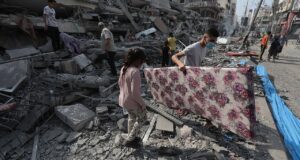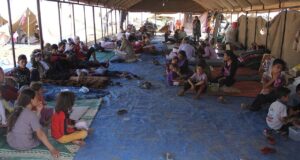Original article published in the Times of Israel, 20th June 2013.
Two and a half years after the war kicked off in Syria the debate rages on over whether the West should get involved or stay out of the brutal conflict.
Some of the arguments presented against intervention are merely political excuses to justify a policy of determined inaction. The Obama administration’s refusal to react strongly to a breach of its self-declared chemical weapons “red line” is a case in point. Other arguments against Western involvement are based on a mixture of oversimplification and misconception. And still others are legitimate concerns which should be taken into careful consideration.
The most common misconception, which has gained popularity over the cause of the war, is that secular Assad, sometimes absurdly portrayed as the guardian of minorities, is fighting against Islamist rebels. This analysis is flawed on several counts.
Firstly, the opposition is not a homogenous entity. The Islamists were not the ones who started the revolution. They hijacked it enabled by desperate people who turned to them simply because there was no one else to turn to. When you look hunger and death in the face you no longer care who provides your security. The instinct for survival is stronger than any political or religious ideology and alliance.
Secondly, the war is no longer between Assad and the rebels; it is now between Assad, Iran and Hezbollah and the rebels and, to a certain extent, their respective international and regional backers like Russia, Saudi Arabia and Qatar. In other words, Syria has become a geopolitical hot spot.
Not only are Iranian Special Forces fighting on behalf of Assad, but over 4000 Hezbollah militia have already poured into the country. On top of that, Assad receives support from Moscow which committed to send the advanced S-300 air-defence system to Syria, capable of grounding commercial planes over Tel Aviv.
Supporting the Islamist ridden FSA may not be a pretty option but to allow Iran, the greatest risk to peace and number one sponsor of international terrorism, and its proxy Hezbollah to take control of ever larger parts of Syria is hardly a more attractive scenario. Especially now that we are approaching the moment where we will have to make difficult decisions over the future of Iran’s nuclear programme, we should do everything in our power to weaken and not strengthen the regime in Teheran.
Further to that, it would also not resolve the Islamist problem. Instead of Sunni extremism we would just be looking at Shia extremism. Consider the vigilant persecution of Christians in Iran or Hezbollah’s promise to annihilate Jews and it becomes abundantly clear that Assad’s backers pose just as much a threat to Syria’s minorities as the Sunni extremists within the opposition.
Let’s face it: Syria is not only a heartbreaking humanitarian crisis, it is a geopolitical nightmare and a serious threat to our long-term national interests and security agenda.
The question is what can and should be done.
The bad news is that intervention should have taken place long ago. The window for meaningful action is rapidly closing, if it is not closed already. The West’s inaction has allowed our enemies to push us into a corner to a point where we only have a choice between bad and worse options.
Arming the opposition will not do the trick. In fact, legitimate concerns have been raised over sending heavy weapons to the rebels, in particular without additional policies in place, such as a No-Fly- Zone. It poses a risk not only because weapons could end up in the wrong hands but because it would likely prolong and not end the war. In other words, it would violate the most crucial criteria for all humanitarian interventions: to recognise our limitations and not make things worse.
If we get involved in Syria, we must get it right and it will require more than a loose commitment and half-hearted support for the opposition. In a first step, the West should make it unequivocally clear that our goal is to bring down Assad, who has lost all legitimacy to rule as a sovereign leader.
Secondly, we must send arms to the rebels only in combination with a No-Fly-Zone, which would provide us with the necessary strategic tool to support the secular and moderate opposition groups on the ground and enable them to take control of key areas. In addition, a No-Fly-Zone would significantly reduce the death toll, since Assad’s forces are killing primarily from the air, and would establish safe havens for the civilian population.
Thirdly, close cooperation with Turkey and Jordan is required to build strong, centralised FSA commands, capable of attacking Damascus from the North and South and seize control over other major cities, such as Homs, Deraa and Qusayr. It would also provide us with an opportunity to split Islamist militia into regional groups and reduce their impact on the overall outcome of the revolution.
Either way, the future looks grim for Syria. But no matter how grim, we still have a humanitarian duty and long-term national security interests to get involved. Imagine what message it would send to dictatorships across the globe, if Assad was to get away with the mass-slaughter of almost 100,000 people. After Rwanda, Bosnia and Darfur, it would engrave yet another scar on the consciousness of the free world. And to let Syria fall into the iron grip of Iran, Hezbollah and Russia would be the worst expression of Chamberlainian appeasement policy and Kissingerian realpolitik we have seen in a long time.
 Human Security Centre Human Rights and International Security Research
Human Security Centre Human Rights and International Security Research



